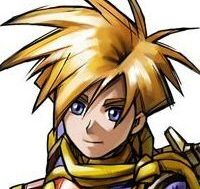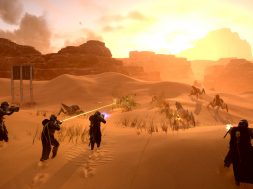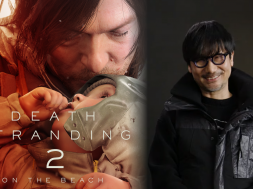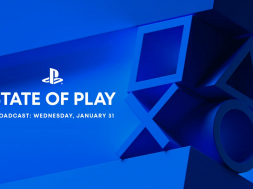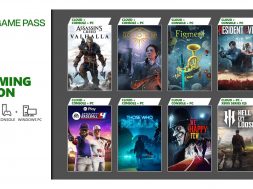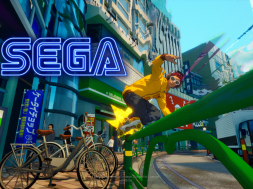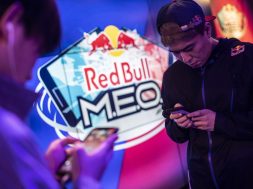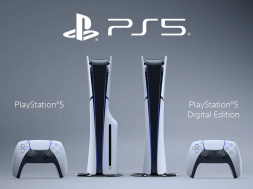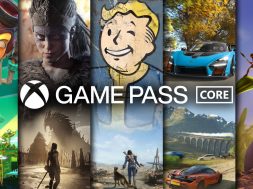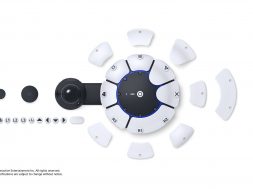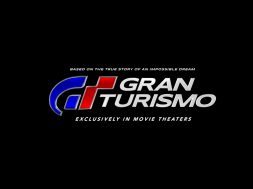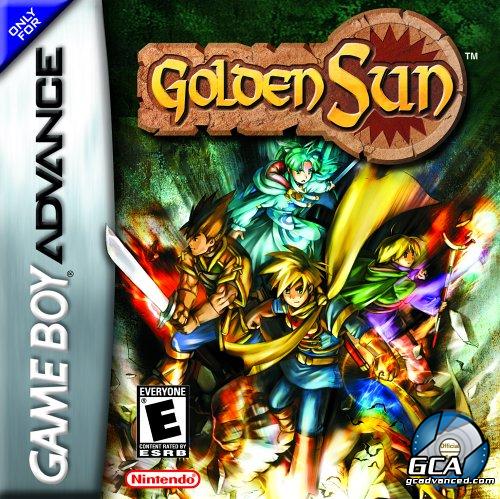
A little while ago I picked up Golden Sun Dark Dawn for the Nintendo DS, and that inspired me to go back and play the series’ original incarnation on the Gameboy Advance. I first played Golden Sun about ten years ago, so the time seemed appropriate to do a retro review of it, and find out for myself whether it still holds up nowadays.
Thankfully, it absolutely does. Golden Sun is a cult classic amongst JRPG fans for a reason, and it’s combination of excellent music by Motoi Sakuraba (acclaimed composer of the Star Ocean games), an interesting world, charming characters, unique mechanics and impressive graphics for the GBA endeared it to many people. It’s standard JRPG fare played to the hilt, so if you’re a fan of the SNES Final Fantasy games then this game will be perfect for you.
Golden Sun‘s story isn’t going to set the world on fire, in all honesty. On a floating chunk of world called Weyard, there was once a magical force called Alchemy. However, Alchemy was abused by the populace and was therefore sealed away, protected by four Elemental Lighthouses: Mercury, Venus, Jupiter and Mars, representing water, earth, wind and fire respectively. In the current day, a group of young Adepts (people who can harness Psynergy, a form of Alchemy) are stricken by tragedy when Mount Aleph, which towers over their home village of Vale, erupts and kills some members of their family.
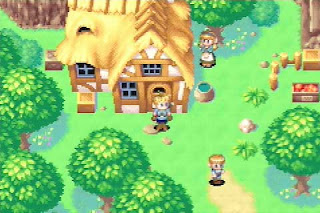
After a time skip of a few years, they are studying Psynergy with their elderly mentor Kraden. Isaac, Garet and Jenna climb Mount Aleph and enter Sol Sanctum, said to be the source of all Psynergy. They reach an inner chamber, where the Elemental Stars which can ignite the Lighthouses are kept. Suddenly a duo of dragon people named Saturos and Menardi (who were also behind the Mt. Aleph disaster) show up, accompanied by a masked man and a blue-haired floating bishounen. They kidnap Jenna and Kraden and steal the Elemental Stars, besides the Mars Star which remains in Isaac’s possession. A big mystical floating brick with an eye tells Isaac and Garet that it’s their fated duty to stop Saturos and Menardi from igniting the Lighthouses because doing so would restore Alchemy to the world, which would be a Very Bad Thing.
So yeah, standard JRPG fare. The only way it could be more retro is if the way to save the world was to obtain all of the elemental crystals. But the execution of the story is good, with dozens of subplots and interesting characters to guide you through it. More important than the story, though, is the setting, which is fairly unique as retro JRPGs go. Initially, in the northern continent of Angara the setting seems like your usual bog-standard fantasy game world. But towards the second half, the locales begin to shift, as the villages become overtly influenced by Oriental and Middle Eastern culture, something I haven’t seen in many JRPGs. The sequels take this even further, with Oceania and African-flavored continents added into the mix. It gives the game a very colourful style, with memorable locations and scenes.

The absolute best part, though, is the mechanics. The way Golden Sun approaches gameplay gives it a unique flavor that keeps it so firmly rooted in people’s memories even now, many years later. For starters, the Djinn system defines a huge part of the game. Djinn are collectable elemental creatures, almost like Pokémon. You can assign them to a character, and depending on whether you set them or put them on standby, each Djinn will have an effect on that character’s stats, Psynergy abilities and class. The rabbit hole of possible combinations runs very deep, and JRPG fans will love figuring out all the potential of the system. The Djinn can also be unleashed in battle for various effects, whether healing, blocking damage or immobilizing an enemy, they come in useful. When a Djinn is used, it goes into the standby state, which drops the user’s stats pretty drastically but also means they can use the standby Djinn to power the game’s strong Elemental summons, which have some of the most stunning art I’ve seen on the GBA.
The other major mechanic of the game is Psynergy itself. Unlike most JRPGs, Golden Sun eschews the linear structure of traditional dungeons (you know the drill: run through in a straight line, find some secret paths to get chests, fight a boss, next dungeon). Instead, it takes cues from the Zelda franchise and turns every dungeon into a complex puzzle, with unique solutions and head-scratching gameplay. Psynergy has a use in the overworld, rather than just in battle, and learning to manipulate your surroundings in a dungeon using magic is integral to progressing in the game. It turns Golden Sun from a grind-filled slog into a game where you’re always thinking about something, be it the numerous puzzles or how best to approach a particularly difficult battle.
Yes, there are a lot of random battles. Yes, the cut-scenes drag on a bit too long. But the fantastic dungeons, well-told story and outstanding music (the main battle theme is one of my favourite battle themes ever) all make up for it. And it’s really only half of the story – the other half is told in The Lost Age, a direct continuation which makes the best use of a new cartridge to expand the world and switch perspectives on the story, with the tale started in Golden Sun by Isaac and co. eventually intertwining with The Lost Age’s. Director Shugo Takahashi has crafted a pair of excellent games, stellar examples of the JRPG genre, proof that you can play all the tropes and clichés absolutely straight and still come out with a hugely enjoyable time-sink. If you like retro JRPGs you absolutely must check this one out.
[easyreview title=”The Arcade Verdict” cat1title=”Gameplay” cat1detail=”Isn’t going to turn JRPG haters, but fans of the genre will find plenty to engage them.” cat1rating=”9″ cat2title=”Graphics” cat2detail=”Impressive for the GBA, with some nice art direction and gorgeous summon sequences.” cat2rating=”9″ cat3title=”Music” cat3detail=”Some of the best battle themes I’ve heard, coupled with some calming atmospheric songs for the overworld.” cat3rating=”9″ overall=”true”]
